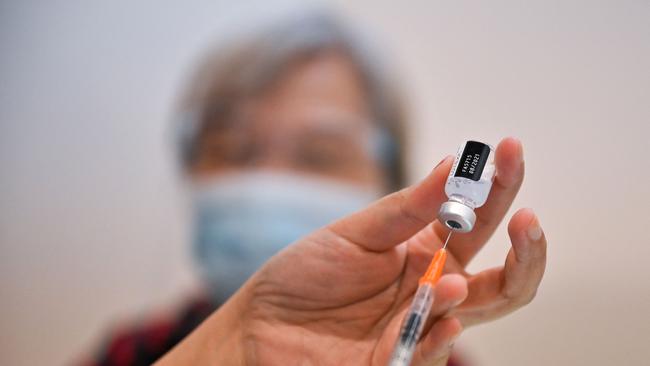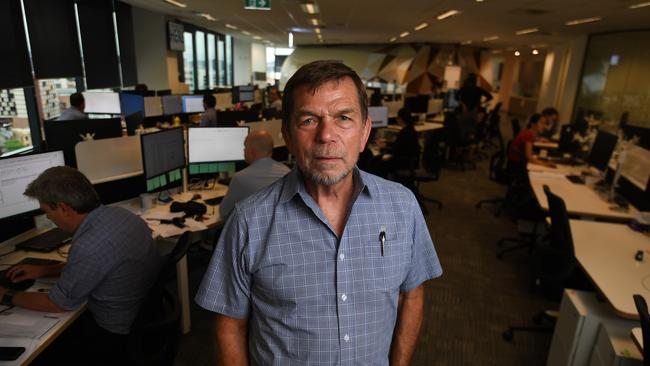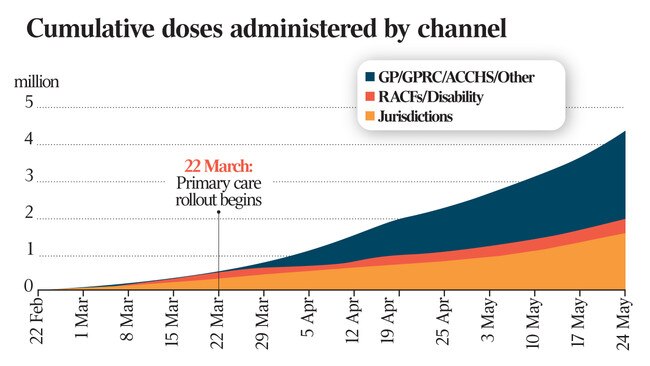Covid vaccination: Business leaders pushing government harder on jabs
Business leaders are becoming increasingly vocal over COVID-19 vaccination take-up, with some calling for vaccines to be made mandatory.

Business leaders are becoming increasingly vocal over COVID-19 vaccination take-up, with the boss of travel giant Flight Centre calling for vaccines to be made mandatory.
Other major employers, such as Westpac and supermarket giant Woolworths, are offering to give staff specific time off to get vaccinated while others are reminding staff they can access company sick leave provisions if necessary.
Flight Centre managing director Graham Turner said on Monday that if the government ordered people into hotel quarantine it could mandate the jab.
He said Australia was in a race to get everyone vaccinated so borders could reopen and life could return to normal.
“It just seems strange that we can mandate compulsory hotel quarantine but make vaccinations voluntary,” said Mr Turner.
“The reluctance to make it compulsory could be political but it just seems to be a double standard.”
Mr Turner’s comments came after Brisbane-based airline Alliance Aviation this week ordered all of its workers to undergo vaccination for COVID-19 or face potential disciplinary action.
Alliance, which has contracts with major mining companies and operates numerous flights for Qantas and Virgin Australia, has issued the vaccination policy, stating “all employees will take part in the Alliance Group Immunisation Program”.
Alliance is believed to be the first Australian company to mandate the jab.
Contractors and their employees will also be required to be vaccinated to conduct work on Alliance Group worksites, the policy states.
Alliance managing director Scott McMillan said management and the company’s board of directors took the view that they had a legal obligation to provide a safe workplace for staff and customers.
Despite his tough stance on vaccination, Flight Centre’s Mr Turner said he would not make jabs compulsory for his own staff, noting that most were already vaccinated.
“There has really not been a need for us to make it compulsory,” said Mr Turner.
“Our Brisbane headquarters is next to the Mater Hospital respiratory clinic and we have been encouraging people to go down in the afternoon to get vaccinated, including younger people under 50.”
He said more than 90 per cent of the 600 people at its Brisbane head office had already been vaccinated.

Woolworths, which is one of the nation’s biggest employers, will provide up to four hours of vaccination leave for full-time and part-time staffers.
Woolworths has also committed that no casual staffers will lose rostered hours if vaccination appointments cannot be sourced outside of rostered shifts.
“We’ve been strongly encouraging our team members to get vaccinated in line with the federal government’s recommendations,” said Woolworths group chief medical officer Rob McCartney.
“To help encourage vaccine uptake, we’ve introduced paid leave options and flexible working arrangements to ensure, wherever possible, our team members can access appointments without a financial disadvantage,” Dr McCartney said.
Woolworths CEO Brad Banducci has also told staffers in multiple internal communications and forums that he’s had his first jab.
National Australia Bank chief executive Ross McEwan said the bank’s staff needed the flexibility and support they need to go and get the vaccine.
“The outbreak in Victoria is a reminder that COVID-19 is not behind us. Communities and business owners have shown how resilient they are – but getting more people vaccinated is how we can avoid future lockdowns,” Mr McEwan said.
“It is important we do not let schedules or workloads be a barrier to people being able to make appointments and get the vaccine. Please make use of the flexible working and leave policies we have in place. This is what they’re there for,” Mr McEwan said in a memo to staff.
Mr McEwan said he had his first dose of the AstraZeneca vaccine a week ago and “it was a quick and simple process”.
“This recovery will not always be smooth – but we all need to do what we can,” he said.
A spokesman for the ANZ Bank said it supported the idea of COVID-19 vaccinations being delivered at workplaces in Australia.
“We were part of a submission to federal government in late February stating that ANZ supports the delivery of COVID-19 vaccinations in Australian workplaces,” the spokesman said.
“We are very supportive of ANZ being involved.”
Virgin Australia said it was “strongly encouraging eligible team members to be vaccinated for COVID-19 in line with the latest government advice.”
It said it was “consulting on these arrangements with respective unions and employee consultative groups”.
While employers have been encouraging staff to get vaccinated most are wary of making it compulsory.
Virgin Australia said it was “strongly encouraging eligible team members to be vaccinated for COVID-19 in line with the latest government advice.”
It said it was “consulting on these arrangements with respective unions and employee consultative groups”.

A Telstra spokesman said the company encouraged those who could take up the vaccine to “consider it as they become available, similar to flu vaccinations.”
“If our people need time to take time off we have sick leave available,” he said.
He said the company was not introducing a policy for our Australian-based employees to get vaccinated.
But he said it would “continue to be informed by relevant government advice, as well as our legal, health and safety obligations.”
A Suncorp spokeswoman said that while it was “encouraging and supporting” employees to get their vaccines, it would not make it mandatory. The spokesperson said it was offering staff leave to attend vaccination and medical appointments. Suncorp’s executive leadership team, meanwhile, have been receiving their vaccines over recent weeks and posting photos on internal employee channels to encourage staff to get the vaccine when they are eligible. Both rail giant Aurizon and Band of Queensland also said they were not making the jab mandatory but encouraging staff to do so to protect themselves and others.
Melbourne-based workplace consultant Maureen Kyne, from Maureen Kyne and Associates, said whether businesses can ask employees to get vaccinated “will depend on whether it’s a reasonable request to make in the context of your business”.
“There’s an obvious difference between asking an aged care or quarantine worker to get vaccinated, compared with someone who works by themselves or remotely.”
She said the Australian government policy was that receiving a vaccination was voluntary.
“Employers who play the vaccination card for employment and promotions, pay rises or even determining which staff it elects to bring back to the office may find themselves embroiled in costly legal disputes.”
“The COVID-19 vaccination is a complex issue and we need to be sensitive to those individuals who for whatever reason, be it anti-vaccine beliefs, political views or religious and medical grounds, can’t or won’t get inoculated.”
“Education and persuasion and a thorough examination of options will generally be a better starting point than confrontation; and it may require employers to seek legal advice to clarify their position.”
Additional reporting: Chris Herde, Eli Greenblat.



To join the conversation, please log in. Don't have an account? Register
Join the conversation, you are commenting as Logout